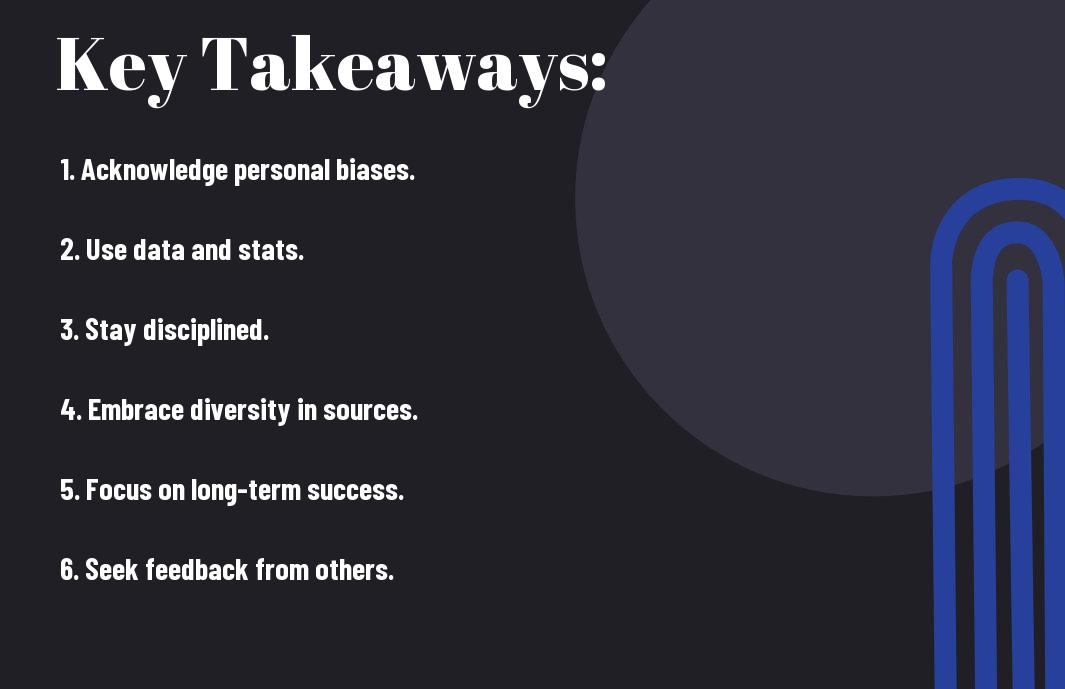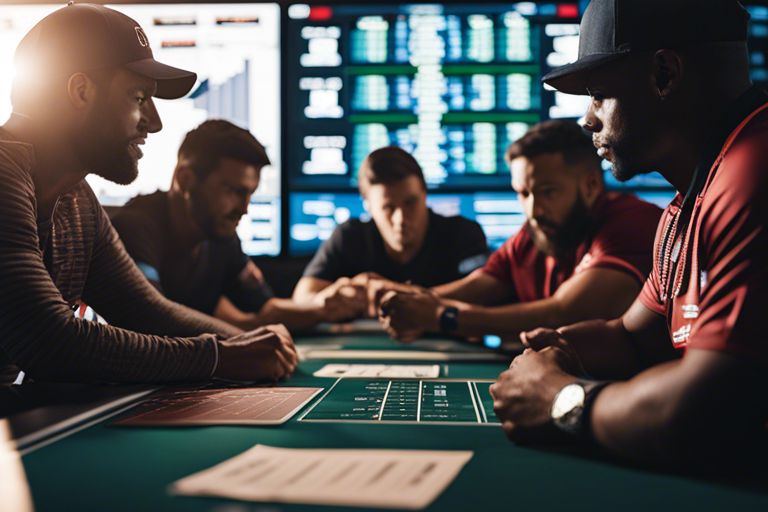You may wonder how sports betting tipsters maintain objectivity amidst their own biases. In this post, we investigate into the strategies they employ to ensure unbiased and accurate analysis. By recognizing and addressing their predispositions, tipsters can provide insightful predictions that are based on facts rather than personal inclinations. Let’s explore how you can navigate your own biases and enhance the quality of your sports betting tips.
Key Takeaways:
- Awareness of biases: Sports betting tipsters must be aware of their own biases to ensure they are making objective analysis.
- Use of data-driven approach: Tipsters can mitigate biases by relying on statistical data and analysis rather than personal opinions or gut feelings.
- Seeking feedback and verification: Tipsters should seek feedback from peers or use verification services to double-check their predictions and ensure objectivity.


The Challenges of Objectivity
Cognitive Biases in Sports Betting
Your mind is a powerful tool when it comes to sports betting, but it can also be your biggest obstacle. Cognitive biases are inherent tendencies to think in certain ways that can lead to deviations from rationality and objectivity. In the context of sports betting, common cognitive biases include confirmation bias, where you seek out information that confirms your existing beliefs, and availability bias, where you overestimate the importance of information readily available to you.
The Dangers of Emotional Attachment
To excel as a sports betting tipster, you must be aware of the dangers of emotional attachment to teams or players. Emotions can cloud your judgment and lead to biased decision-making. When you have a favorite team or player, you may unconsciously overestimate their chances of winning, leading to poor betting choices. It’s crucial to maintain emotional detachment and approach your analysis with a clear and objective mind.
Cognitive biases and emotional attachments can significantly impact your sports betting performance. Being mindful of these challenges and actively working to overcome them can help you make more rational and informed decisions, ultimately improving your success as a sports betting tipster.

Self-Awareness and Reflection
There’s a crucial aspect of self-awareness and reflection that sports betting tipsters need to master to overcome their biases. According to Psychological factors: Understanding the Mindset of Inplay Betting, by recognizing personal biases, you can better understand how they influence your analysis and predictions. Identifying where your biases stem from is the first step in mitigating their impact on your decision-making process. Regular self-assessment and reflection on your past predictions and the reasons behind them can help you become more aware of your biases.
Identifying Personal Biases
There’s no shame in admitting that you have biases; it’s a natural human tendency. By acknowledging your predispositions towards certain teams, players, or situations, you can take proactive steps to prevent these biases from clouding your judgment. This introspection allows you to approach your analysis with a more objective perspective, leading to more accurate predictions.
Recognizing Emotional Triggers
Biases are often triggered by emotions, such as fear of losing or the thrill of a potential big win. Recognizing these emotional triggers is important in controlling your biases. When you feel emotions influencing your decisions, take a step back, and reassess the situation rationally. Understanding how your emotions can lead to biased predictions is key to making objective choices in sports betting.
Self-awareness is crucial in managing biases and making informed decisions in sports betting. By recognizing when your emotions are clouding your judgment, you can take a step back, reassess, and make more rational predictions. Developing a growth mindset can further aid in this process.
Developing a Growth Mindset
Biases can hinder personal growth and learning. By adopting a growth mindset, you see challenges as opportunities to learn and improve, rather than as setbacks. Embracing this mindset allows you to view mistakes as learning experiences, helping you refine your analytical skills over time. Encouraging a growth mindset in your approach to sports betting can lead to more accurate predictions and long-term success.
Plus, by consistently reflecting on your past predictions, identifying your biases, and cultivating a growth mindset, you can enhance your objectivity in sports betting and make more informed decisions.
Data-Driven Analysis
The Importance of Objective Metrics
An vital aspect of managing biases as a sports betting tipster is to rely on objective metrics for analysis. These metrics provide you with quantifiable data that can help you make more informed and rational decisions. By focusing on concrete numbers rather than subjective opinions, you can reduce the impact of bias on your predictions.
Using Data to Inform Decisions
For sports betting tipsters, leveraging data to inform decisions is key to minimizing biases. By utilizing historical data, statistical trends, and performance metrics, you can develop a more objective approach to analyzing games and identifying potential outcomes. Data-driven analysis allows you to base your predictions on evidence rather than personal feelings or preconceived notions.
Data-driven decision-making involves collecting, analyzing, and interpreting relevant data to guide your tipster strategies. Whether you are evaluating team performance, player statistics, or game conditions, having access to comprehensive data sets can help you make more accurate and unbiased predictions.
Avoiding Confirmation Bias
For sports betting tipsters, avoiding confirmation bias is crucial in maintaining objectivity in your analysis. This bias occurs when you seek out information that supports your existing beliefs or predictions while ignoring evidence that contradicts them. To counter confirmation bias, you must actively challenge your assumptions and be open to considering all perspectives and data points.
Confirmation bias can lead you to overlook crucial information or dismiss alternative viewpoints, ultimately hindering your ability to make sound predictions. By consciously seeking out diverse sources of data and actively questioning your initial assumptions, you can guard against the pitfalls of confirmation bias and enhance the quality of your analysis.
Diversifying Perspectives
Many sports betting tipsters understand the importance of diversifying perspectives to counteract biases and ensure objective analysis. By seeking out contrarian views, tipsters can challenge their own assumptions and preconceived notions, leading to more well-rounded and comprehensive insights.
Seeking Out Contrarian Views
Contrarian perspectives force you to question the status quo and consider alternative viewpoints that may have been overlooked. By actively seeking out dissenting opinions, you are encouraged to critically evaluate your own analysis and strengthen your overall decision-making process.
Engaging with Other Experts and Analysts
Other experts and analysts can provide valuable insights and feedback that can help you broaden your perspective and deepen your understanding of the sports betting landscape. By engaging with a diverse range of professionals in the field, you can gain new perspectives, learn different strategies, and refine your own approach to tipster analysis.
Seeking out diverse perspectives is crucial for sports betting tipsters looking to manage their biases and ensure objective analysis. By actively engaging with contrarian views, other experts, and constructive criticism, you can cultivate a more well-rounded and informed approach to your tipster activities.
Managing Emotional Influences
Coping with Losses and Setbacks
For sports betting tipsters, coping with losses and setbacks is a crucial aspect of managing emotional influences. It’s important to remember that losses are part of the game and not a reflection of your abilities. One way to cope is by maintaining a long-term perspective. Recognize that fluctuations in performance are normal and focus on your overall track record rather than individual outcomes.
Avoiding Overconfidence and Complacency
Influences such as overconfidence can lead to risky decision-making in sports betting. It’s important to remain humble and avoid becoming too comfortable with past successes. Continuously reassess your strategies and remain open to feedback and improvement. By staying alert to the possibility of bias creeping in, you can maintain a more objective and rational approach to your analysis.
With the unpredictable nature of sports betting, acknowledging the role of luck in outcomes can help you avoid overestimating your abilities. By embracing a mindset that balances confidence with humility, you can make more informed decisions and reduce the impact of emotional influences on your analysis.
Maintaining a Healthy Work-Life Balance
The key to managing emotional influences in sports betting tipsters is to maintain a healthy work-life balance. Avoiding burnout is crucial for staying objective and making sound decisions. Ensure you take breaks, engage in activities outside of betting, and prioritize self-care to keep your mind sharp and focused.
Plus, incorporating mindfulness practices such as meditation or exercise can help you stay present and manage stress effectively. By nurturing a balanced lifestyle, you can enhance your emotional resilience and make more rational decisions in your sports betting endeavors.
Implementing Accountability Measures
Unlike other professions, sports betting tipsters face unique challenges when it comes to managing biases. One significant bias that tipsters must guard against is confirmation bias. This bias can lead you to seek out information that confirms your preconceptions while ignoring evidence that contradicts them. To learn more about Confirmation Bias In Sports Betting & How To Avoid It, check out this article.
Establishing Clear Goals and Objectives
Any successful sports betting tipster will tell you that setting clear goals and objectives is crucial for staying accountable and objective in your analysis. By defining what you want to achieve and the metrics by which you will measure your success, you can help mitigate biases that may sway your judgment. Whether it’s increasing your winning percentage or improving your bankroll management, having clear goals in place can keep you focused and on track.
Regularly Reviewing and Evaluating Performance
An crucial step in maintaining objectivity as a sports betting tipster is to regularly review and evaluate your performance. By analyzing your past picks, outcomes, and decision-making processes, you can identify any patterns of bias or errors in your analysis. This self-assessment allows you to course-correct, learn from your mistakes, and continuously improve your betting strategy.
Performance monitoring is an ongoing process that requires diligence and honesty with yourself. Keeping detailed records of your bets, outcomes, and thought processes can provide valuable insights into your performance and help you adjust your strategies accordingly. By consistently evaluating your performance, you can stay accountable to yourself and decrease the influence of biases in your decision-making.
Encouraging Transparency and Open Communication
An open and transparent communication style can also help you hold yourself accountable as a sports betting tipster. By sharing your thought processes, strategies, and results with others in the betting community, you invite feedback and constructive criticism that can help you stay objective and improve your performance. Building a network of like-minded tipsters who can provide support and offer different perspectives can be valuable in keeping biases in check.
To foster transparency and open communication, consider joining forums, online communities, or social media groups dedicated to sports betting. Engaging in discussions, sharing insights, and receiving feedback from others can help you identify blind spots, challenge your thinking, and maintain a healthy level of skepticism in your analysis. Be mindful of, staying open to feedback and being willing to adapt your approach based on new information is key to long-term success in sports betting.
Final Words
Hence, when delving into the world of sports betting tipsters, it is crucial to acknowledge the presence of biases and understand how they can impact decision-making. Tipsters must actively work to manage their own biases and ensure they are conducting objective analysis. By being aware of cognitive biases such as confirmation bias, availability bias, and anchoring bias, tipsters can strive to make more informed and accurate predictions.
Remember that no one is completely immune to biases, but by applying critical thinking skills, seeking diverse perspectives, and continuously reassessing your analysis, you can enhance the quality of your betting tips and increase your chances of success. Managing biases is an ongoing process that requires self-awareness and a commitment to remain objective in your analysis. By taking these steps, you can elevate your sports betting predictions and navigate the complex world of sports wagering with greater confidence and precision.
Q: How do sports betting tipsters recognize and manage their biases?
A: Sports betting tipsters can recognize biases by reflecting on their past performances, seeking feedback from others, and staying informed about common cognitive biases. To manage biases, they can use objective criteria for analysis, maintain a detailed betting journal, and constantly challenge their own assumptions.
Q: What strategies can sports betting tipsters use to ensure objective analysis?
A: Tipsters can employ statistical models and data analysis tools to remove emotions from decision-making. They can also collaborate with other tipsters for diverse perspectives, double-check their work through peer review, and create pre-established rules for placing bets based on data-driven factors.
How can sports betting tipsters avoid groupthink and confirmation bias?
A: Tipsters can avoid groupthink by encouraging independent thinking, welcoming dissenting opinions, and considering a variety of sources before making a final decision. To combat confirmation bias, they should actively seek out evidence that contradicts their initial beliefs, practice self-awareness to recognize when they are seeking validation, and regularly review their analysis process to ensure thoroughness.



